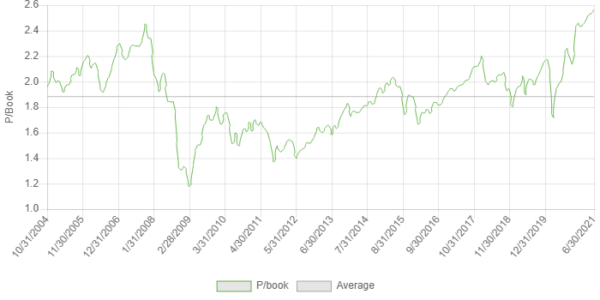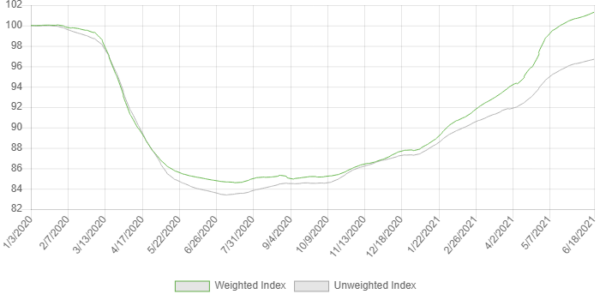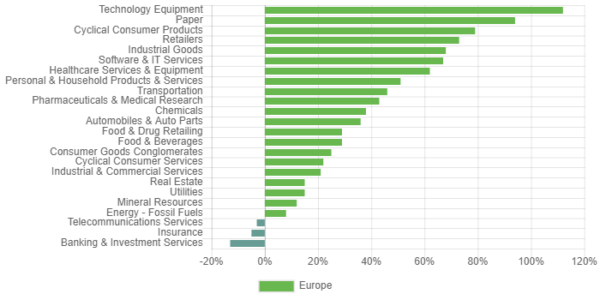Jul
2021
Global equities: Volatility rises at the upper reaches of valuation
DIY Investor
24 July 2021
 Despite the arrival of ‘freedom day’ in the UK and the strength of other developed market economic recoveries, global equity market progress has been relatively muted in recent months.
Despite the arrival of ‘freedom day’ in the UK and the strength of other developed market economic recoveries, global equity market progress has been relatively muted in recent months.
More recently, in the last week equities have slid from highs and bond yields have fallen. Yet global sectors are still trading at historically high valuations. Investors seem to have become shy of chasing equities higher, absent actual delivery of promised profits growth for 2021 and beyond.
For the UK, ‘freedom day’ is increasingly looking like business as COVID-usual in terms of restrictions on physical mobility, with reports of 500,000 English residents per week placed under NHS contact tracing self-isolation.
We believe investors are aware of their limited investment choices at present. Low bond yields, low corporate credit spreads and the anticipation of an extended period of accommodative monetary policy into 2022 are in our view the primary driver of relatively high equity valuations – and it is not necessarily irrational.
Should profits forecasts match expectations, markets could trade sideways as earnings catch up over time. Low interest rates and rapid profits growth have been the basis for our neutral view on equities during 2021.
On the other hand the scope for a correction in equity prices is clearly present given that global equities are trading close to a 15y-record forward price/book multiple. On balance, risks to the outlook are increasing. Investors are having to digest higher than expected inflation, slowing economic growth (even if consensus forecasts are still rising modestly) and the rapidly spreading delta covid variant.
Exhibit 1: Global equities close to 15y record price/book

There is perhaps an unfortunate juxtaposition at present. Talk of removing the monetary punch bowl in the UK and US has gathered momentum as inflation has risen beyond expectations and pandemic fiscal support programs are being phased out. Growth is slowing and as importantly investors are not getting the ‘clean break’ from the pandemic that was hoped for as recently as December.
Exhibit 2: 2021 Upward global consensus earnings forecasts revisions have slowed in recent months

While the spread of the delta variant in the largely vaccinated population of the UK may be only a fraction as deadly as previous waves, questions linger over the impact and prevalence of “long covid” on younger and fitter members of the population.
The UK government has also come under criticism for opening up the economy from international scientists on July 19th, also known as ‘freedom day’. However, while this unusual intervention may have been high profile, the focus of this criticism was on mask wearing and adequate ventilation rather than any prescription for a more severe lockdown.
It is not clear how much practical difference lies between the current UK government policy for England and more restrictive regimes in any case. We suspect many in England will not alter their mask-wearing behaviour significantly until cases have declined, out of personal self-interest.
More importantly for future policy direction, popular support in the UK for the recent relaxation of lockdown is weak, with a recent YouGov poll which recorded 55% of English respondents believing it was wrong. While we have recently written that hospital cases are tracking at a small fraction of previous levels, we have to now acknowledge that a more cautious electorate may impinge on lockdown policy and create risks to the growth outlook in the UK and beyond as cases rise over the summer.
Exhibit 3: Premium to average P/book by sector

As risks to the outlook have grown, investors find equities trading close to their 15-year record forward price/book levels which on the face of it offers a limited cushion for any downside surprises. We observe that global sector valuations are almost universally above average except insurance, banking and telecoms – possibly interesting places to look for specific company opportunities as these sectors are consensus underperformers.
Nearly one-half of global sectors are more than 40% above their long-run forward price/book multiple at present. On a country perspective, US markets are significantly above their long-run average while European markets are only marginally above fair value on this measure.
In terms of the portfolio response to this data, when markets decline even relatively low valuations provide very little protection from capital losses in the short-term. Unloved sectors struggling to attract the marginal investment dollar are even less likely to do so at a time when investors are seeking to reduce portfolio risk rather than add to it.
Following the vaccine-led recovery, we believe prudent investors will now be looking to take profits in sectors which have outperformed and are currently richly valued, whether in technology franchises or in value names which have performed well this year.
Until recently, in 2021 investors have enjoyed relatively low volatility as the benefits from previously announced monetary and fiscal policy have flowed into financial markets and later into corporate profitability. The less attractive investment features of 2021, such as the inevitable growth slowdown from the heady rates of H121, the surge in inflation and the possibility of more transmissible variants have now come to the fore.
While we remain neutral on global equities, from the preceding comments we are clearly closer to cautious than overweight. We believe long-term investors should remain focused on sectors and geographies which are not so clearly overvalued and are likely to offer better returns over the medium-term.
Click to visit:
Leave a Reply
You must be logged in to post a comment.